Walt-Whitman--沃尔特·惠特曼-英美文学
惠特曼
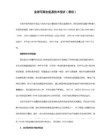
姓名:惠特曼 出生年月:1819年-1892年 国籍:美国惠特曼是美国十九世纪杰出的民主诗人。他出身于农民家庭。当过木工、排字工、教师、报纸编辑、职员。他一生创作了大量诗歌,编入《草叶集》。惠特曼的创作分三个时期。南北战争前,他的诗歌主要是反对奴隶制和民族压迫,歌颂自由和民主,歌颂劳动和劳动人民,描写大自然和人。这时期创作了《自己之歌》、《一路摆过布鲁克林渡口》等诗篇。南北战争期间,他激励人们投入反奴隶制战争,歌颂战争英雄,哀悼被刺的林肯总统。小说诗歌文学作品有诗集《桴鼓集》。战后,惠特曼的诗歌揭露资产阶级民主的虚伪,讴歌欧洲革命运动,赞颂人类物质文明。诗作有《神秘的号手》、《通向印度之路》等。在艺术上,惠特曼打破传统的诗歌格律,创造了"自由体"的形式,借以充分地表达自己的思想感情。他的创作对欧美诗歌的发展影响极大。《自己之歌》、《桴鼓集》、《一路摆过布鲁克林渡口》、《神秘的号手》、《通向印度之路》等。 瓦尔特·惠特曼(Walt Whitman,1819~1892)是美国历史上最伟大的诗人,他创作的《草叶集》代表着美国浪漫主义文学的高峰,是世界文学宝库中的精品。《草叶集》反映了美国在内战前后从农业经济发展到一个工业大国的进程,用一个新的乐观的声音歌颂一个新民族的崛起。惠特曼不为附炎宗教与现行制度而创作,也不屑于附庸上流社会品茗赏画的琐碎风雅。他歌颂的对象都是处于社会下层的体力劳动者,如车夫、矿工和农人等,并对美国的前途充满了信心,是一位真正的民族诗人。在风格上,惠特曼彻底摈弃了古板的格律,用自由体的形式抒发自由的思想。在写意上,他受当时刚发明的摄影技术的影响,除了追求写真外,一行诗句捕捉一刹即遁的时刻,静态中表现出动感。更具开创性的是,他打破了一千多年以来的宗教禁忌,石破天惊地高声讴歌“同志之爱”(Comradeshi­p),并且乐观地预言同志之爱的新时代将到来,而这种情爱将推动社会的前进。一个多世纪过去了,惠特曼诗歌中所表现的理想与进取精神仍是美国以至各国同性恋者追求自由和解放的力量源泉。然而,惠特曼的自我解放却走过了一条曲折的心路。
沃尔特惠特曼

1856年,第2版《草叶集》出版,共收诗32首。《一路摆过布鲁克林渡口》是诗人最优秀的作品之一。此外, 《阔斧之歌》、《大路之歌》也是名篇。
1859年,《星期六周刊》的圣诞专号上刊出了惠特曼的一首优秀抒情诗《从永不休止地摆动着的摇篮里》, 这是一首爱情和死亡的颂歌。次年应波士顿一出版家之请,印行了《草叶集》第3版,这本诗集算是第一次“正式 出版”。集中有124首新诗,包括《从永不休止地摆动着的摇篮里》和3组分别名为《民主之歌》、《亚当的子 孙》、《芦......
沃尔特·惠特曼
著名诗人人文主义者
目录
01 人物经历
03 作品பைடு நூலகம்版情况
02 人物生平
基本信息
沃尔特·惠特曼(英语:Walt Whitman,1819年5月31日-1892年3月26日),出生于纽约州长岛,美国著 名诗人、人文主义者,创造了诗歌的自由体(Free Verse),其代表作品是诗集《草叶集》(Leaves of Grass)。
人物经历
人物经历
28岁 1841年搬到纽约。 1855年父亲去世,后并出版《草叶集》(Leaves of Grass)第一版。 1862年,探望在腓烈德利斯堡战役中受伤的兄弟。1865年,林肯被暗杀,惠特曼的战时诗集 Drum-Taps (后来放到《草叶集》中)出版。1871年母亲路易莎去世。 1882年,会见奥斯卡·王尔德,出版 Specimen Days and Collect。1885年 为纪念林肯逝世20周年,作诗 《献给那个被钉在十字架上的人》,后收入《草叶集》。 1888年,第二次打击。严重的疾病。 1891年,草叶集最后一版。 1892年3月26日,惠特曼去世。 他在九个兄弟姐妹中排行第二。1823年,惠特曼一家移居到纽约布鲁克林区。惠特曼只上了6年学,然后开 始做印刷厂学徒。惠特曼基本上是自学的,他特别喜欢读荷马、但丁和莎士......
美国作家简介
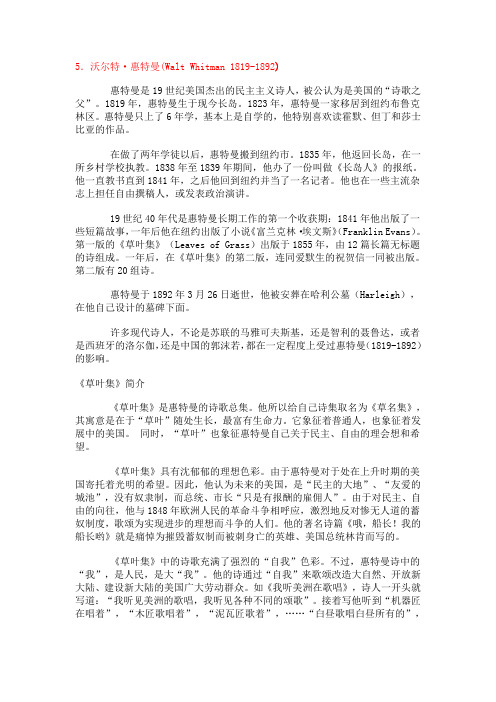
5.沃尔特·惠特曼(Walt Whitman 1819-1892)惠特曼是19世纪美国杰出的民主主义诗人,被公认为是美国的“诗歌之父”。
1819年,惠特曼生于现今长岛。
1823年,惠特曼一家移居到纽约布鲁克林区。
惠特曼只上了6年学,基本上是自学的,他特别喜欢读霍默、但丁和莎士比亚的作品。
在做了两年学徒以后,惠特曼搬到纽约市。
1835年,他返回长岛,在一所乡村学校执教。
1838年至1839年期间,他办了一份叫做《长岛人》的报纸。
他一直教书直到1841年,之后他回到纽约并当了一名记者。
他也在一些主流杂志上担任自由撰稿人,或发表政治演讲。
19世纪40年代是惠特曼长期工作的第一个收获期:1841年他出版了一些短篇故事,一年后他在纽约出版了小说《富兰克林·埃文斯》(Franklin Evans)。
第一版的《草叶集》(Leaves of Grass)出版于1855年,由12篇长篇无标题的诗组成。
一年后,在《草叶集》的第二版,连同爱默生的祝贺信一同被出版。
第二版有20组诗。
惠特曼于1892年3月26日逝世,他被安葬在哈利公墓(Harleigh),在他自己设计的墓碑下面。
许多现代诗人,不论是苏联的马雅可夫斯基,还是智利的聂鲁达,或者是西班牙的洛尔伽,还是中国的郭沫若,都在一定程度上受过惠特曼(1819-1892)的影响。
《草叶集》简介《草叶集》是惠特曼的诗歌总集。
他所以给自己诗集取名为《草名集》,其寓意是在于“草叶”随处生长,最富有生命力。
它象征着普通人,也象征着发展中的美国。
同时,“草叶”也象征惠特曼自己关于民主、自由的理会想和希望。
《草叶集》具有沈郁郁的理想色彩。
由于惠特曼对于处在上升时期的美国寄托着光明的希望。
因此,他认为未来的美国,是“民主的大地”、“友爱的城池”,没有奴隶制,而总统、市长“只是有报酬的雇佣人”。
由于对民主、自由的向往,他与1848年欧洲人民的革命斗争相呼应,激烈地反对惨无人道的蓄奴制度,歌颂为实现进步的理想而斗争的人们。
美国文学Walt Whitman
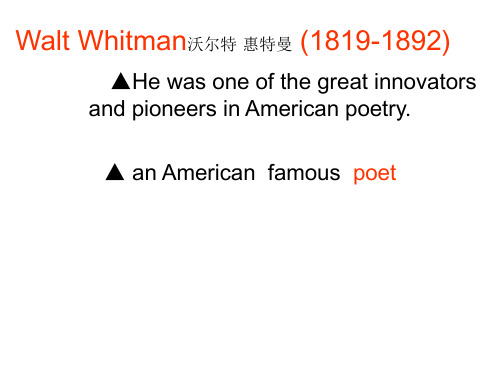
• In the poem, I or myself, in its most limited sense, is Whitman himself; but in its largest and most frequent sense, it is generic and representative of all men. The image of this poem is panoramic(全景的), flowing and expanding without end. • Through the creation of multiple images, Whitman expresses his innermost being, the spirit of the age and country and the unity of all human experiences. • The structure of this poem is also original, different from the traditional poetic pattern. The movement of this poem is circular rather than linear.
Walt Whitman沃尔特· 惠特曼 (1819-1892)
▲He was one of the great innovators and pioneers in American poetry. ▲ an American famous poet
life
• Growing up in a working-class background in Brooklyn, New York, Whitman had very little education. • In 1840s, to pick up some first-hand knowledge of life and people, he worked as a shopkeeper, an apprentice to a printer and an editor of various newspapers. • In 1848, he visited New Orleans, Chicago and the western frontier and saw much of the Mississippi heartlands. This experience furnished both material and the guiding spirit for his epic, Leaves of Grass, the first edition of which (15poem) was published in 1855.
Walt Whitman(1819-1892)

•ห้องสมุดไป่ตู้
……
•
打开大门上的锁/从门柱上撬开大 门/……通过我而发出被禁制的呼声:/ 性的和肉欲的呼声……/我认为欢媾并不 比死更粗恶,/我赞赏食欲和色欲,/视觉、 听觉、感觉都是神奇的。
——《自己之歌》(《Song of Myself》)
•
诗人把自己描绘成 所有人中的一个。 • 这个人是超群的, 又是普通的;有优点, 也有毛病,甚至道德 并不完美。 • 就象一棵大树上一 片普通的叶子,一个 草原上的一株普通的 小草。
• Song of Myself 自我之歌(我 自己的歌) • I Sit and Look Out 我坐在这儿 眺望着 • I hear America Singing 我听见 美国在歌唱 • O Captain! My Captain! 船长! 我的船长! • Beat! Beat! Drums! 敲吧 战鼓! • Democratic Vistas 民主的前景 • The Tramp and Strike Question 流浪汉和罢工问题
•
Major Themes in His Poetry
• Equality of things and beings • Divinity of everything • Multiplicity of nature • Self-reliant spirit • Death, beauty of death • Expansion of America • Brotherhood and social solidarity (unity of nations in the world) • Pursuit of love and happiness
Free Verse: 自由诗
惠特曼英文简介

惠特曼英文简介沃尔特·惠特曼,美国著名诗人、人文主义者,他创造了诗歌的自由体,下面是店铺为你整理的惠特曼英文简介,希望对你有用!沃尔特·惠特曼简介Walt Whitman (Walt Whitman, May 31, 1819 - March 26, 1892) was born in Long Island, New York, a famous American poet, humanist, who created the free body of poetry ), Its representative works are poems "grass leaves set".沃尔特·惠特曼生平简介BornPoet. May 31, 1819 was born in Long Island. The father was farming, and the poor moved to Brooklyn, working as a carpenter and building a house. He was interested in the imagination of the socialist thinker and the composer of the democratic thinker, Paine. Whitman studied in public schools, served as rural teachers; childhood also had a messenger, learned typography. Later in the newspaper work, has become editor. He likes to wander, meditate, and enjoy the beauty of nature; but he prefers the city and the streets, like opera, dance, speech, like reading Homer, Greek tragedy and Dante, Shakespeare's works. From February 1846 to January 1848, he was editor of the "Brooklyn Eagle". In 1848 went to New Orleans to edit the newspaper and soon returned to Brooklyn. After five or six years, he helped the old father to build a house, operating a small bookstore, a small printing factory, free to loose, free to wander; and teenager, enjoy and boatman, navigator, coachman, mechanic, fisherman , Handyman, etc. make friends.Grass set1855 "grass leaves set" the first version of the advent of atotal of 12 poems, and finally out of the 9th edition of a total of 383 poems. One of the longest one, that is later known as the "song of their own" that poem. A total of 1336 lines. The content of this poem almost includes the author's main thought of his life, is one of the most important poems of the author. The poem has repeatedly mentioned the grass leaves: grass leaves symbolize all ordinary, ordinary things and ordinary ordinary people. This epic poetry is universally cold, and only Emerson wrote a warm letter to the poet. Whitman received great encouragement from this letter."Grass set" is the most important work of Whitman poetry, named after the concentration of such a poem: "Where there is soil, where there is water, where the long grass." Poems in the poems like the United States The earth's grass, vibrant and exudes attractive aroma. They are world famous masterpiece, created a new era of American national poetry. The author has bold innovation in the form of poetry, created the "free body" of the poetic form, breaking the traditional poetry of the law, to break the sentence as the basis of rhythm, the rhythm of free and unrestrained, Wang Yang unrestrained, Shu volume freely, with blew of momentum and no Not the capacity of the package.1856, the second edition of "grass leaves set" published a total of 32 poems. "All the way through the Brooklyn ferry" is one of the poet's best works. In addition, "the song", "song of the road" is also famous.In 1859, "Saturday Weekly" published on the Christmas number of Whitman's excellent lyrics "from the never-ending swing in the cradle", this is a love and death of the carol. The next year should be a publication of Boston, please print the "grass leaves set" version 3, this poem is the first "official publication".There are 124 new poems, including "from the never-ending swing cradle" and three groups were named "song of democracy", "Adam's descendants", "reed" poetry.War eraDuring the Civil War, Whitman, as a firm democratic fighter, showed his deep humanitarian character. When the war intensified, he took the initiative to Washington to serve as a nurse, all day care and injury of the soldiers, resulting in serious damage to health. His life is very hard, by copying the date, the money saved in the sick and wounded. He served as a nurse for nearly two years, approaching about 100,000 soldiers, and many later kept in touch with him.Postwar lifeAfter the war, Whitman was appointed as a small staff member of the Indian Affairs Office of the Ministry of the Interior. Soon the minister found that he was the author of the "Grass Leaf Set" and dismissed him; he later served in the office of the Minister of Justice for eight years. As a result of the exercise in the civil war, increased experience, political thought has also been improved, his creation has entered a new stage. In 1865, Whitman in New York at their own expense printed his poems in the late civil war "桴 drum set", which received a total of 53 new poems. A few months later he published a sequel, including the memorial Lincoln's famous "recently lilac in the courtyard when the open."沃尔特·惠特曼作品出版情况In 1867 the "grass leaves set" fourth edition only eight new poems, but the income of the "drum set" and its sequel. It is worth noting that the long article published in 1871 "democratic vision", it summed up the author's literary and political ideas.The fifth edition of the "Grass Leaf Set" was printed once in 1871 and 1872.The first income of 13 new poems, the second income general critics recognized as the poet's last important long poem "Road to India" and a few new poems. In January 1873 Whitman was suffering from paralysis, writing ability from also depressed. But his optimism, love and sensitivity to life, his ideal of democracy, or so to death. His old age depressed unsuccessful, in addition to the preparation of several versions, and occasionally write some poetry. In 1876, the 6th edition of the "Grass Leaves" was published to commemorate the 100th anniversary of the Declaration of Independence. This is a collection of essays, including the two volumes, the first volume of the fifth edition of the content, the second volume he named "two streams", including prose, 18 new poems, "leading to India Road "and poems, poems tend to abstract. The text of the seventh edition (1881-1882) of the "Grass Leaf Set", the title of each poem and the order of the arrangement, have been finalized, and this edition has received 20 new poems. Whitman continued to write poetry until his death in 1892.In 1882 the poet published his essay collection "Typical Days", which included the "democratic vision" article. Published in 1888, "November", the income of 62 new poems and some articles, concentrated poems later income "grass leaves set" 8th edition (1889), and become "poem". In 1891 Philadelphia's publisher published Whitman's new work "Goodbye, my fantasy", where the poem became "grass leaves" and "poem". "9" (1892), including "poem", "seventy years" and "attached poem two" "goodbye, my fantasy." Poet after the death of the poem "Elderly echo", as "with poetry". See 1897 to 1898 published collection,after the collection of the whole collection also income. After 1898 the universal collection, is the so-called "dying version", that is published in 1892 edition 9."Flying in freedom and strength" was incorporated into the second edition of the first semester of the seventh edition of the seventh edition.。
Walt Whitman 沃尔特·惠特曼 英美文学 ppt课件
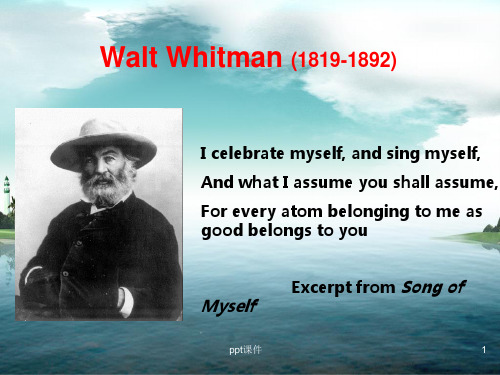
• Edited a newspaper, the LongIslander, in Huntington
• Back to New York City to work as a printer and journalist
• Experienced various jobs
• Began writing a new kind of poetry
(freepptv课e件rse)
3
Whitman's democratic ideals& individualism
America’s first “poet of democracy”
Whitman's democratic ideas govern his poetry-writing.
In his famous poetry, openness, freedom, and above all, individualism (the belief that the rights and freedom of individual people are most important) are all that concerned him.
2. Individual value
3. Pursuit of love and happiness
4. Sexual love The individual person and his desires must be respected.
ppt课件
5
Influence
America’s first “poet of democracy”
• At four, family moved to Brooklyn, New York
Walt-Whitman--沃尔特·惠特曼-英美文学PPT课件

• Edited a newspaper, the LongIslander, in Huntington
• Back to New York City to work as a printer and journalist
• Experienced various jobs
• Began writing a new kind of poetry
• filled with optimistic expectation and enthusiasm about new things and new epoch.
1. The whole hard-working people The burgeoning life of cities. The fast growth of industry and wealth in cities
2. Individual value
3. Pursuit of love and happiness
4. Sexual love
5. The individual person and his desires must be respected.
.
5
Influence
America’s first “poet of democracy”
.
Excerpt from Song of
美国文学-Walt Whitman
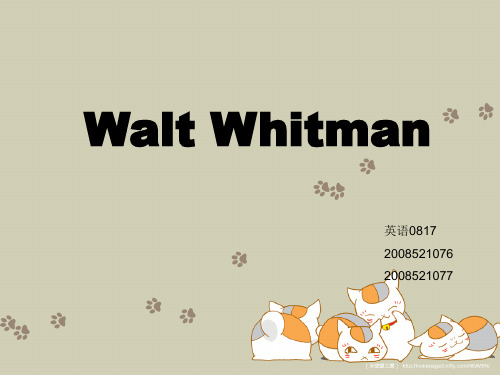
• He has been compared to a mountain in American literary history. • His innovations in diction and versification, his frankness about sex, his inclusion of the commonplace and the ugly and his censure of the weakness of the American democratic practice—these paved his way to a share of immortality in American Literature.
poetry anthology
• Through out Whitman’s life, Leaves of Grass went through 9 editions: 1855, 1856, 1860, 1867, 1871, 1876, 1881, 1889, 1891-92. • The first edition of Leaves of grass contained 12 poems, not sell well but it made a stir on the American literary scene. Because it broke with the poetic convention and expressed the pleasures of sex and the sensuality of the body, it was criticized as “noxious weeds”, “poetry of barbarism”.
Song of Myself(节选) by Walt Whitman Not I, not any one else can travel that road for you, You must travel it for yourself. 我不能,其他任何人也不能替你走那条路, 你必须自己走。 It is not far, it is within reach, Perhaps you have been on it since you were born and did not know, Perhaps it is everywhere on water and on land. 它并不遥远,它是可以到达的。 也许你一出生就已在那条路上了,不自知而为之, 或许这路在水中、于陆上,处处都有。
沃尔特·惠特曼 Walt Whitman 美国文学史

• Equivalence of body and soul and the unabashed(不 加掩饰的) excitement of the body and sexuality.
Over the next 37 years, it appeared in nine editions altogether.
Drum-Taps(1865) --《桴鼓集》 collected into Leaves of Grass
When Lilacs Last in the Dooryard Bloom (1865) --《最近紫丁香在庭 院里开放的时候》
Creeds and schools in abeyance, 教条和学派先放一旁,
Retiring back a while sufficed at what they are,but never forgotten, 让他们暂且后退,满足于现状,但不被遗忘,
I harbor for good or bad,I permit to speak at every hazard, 我心怀善与恶,我要不顾一切地述说,
When he was sixteen, he worked as a teacher in the one-room school houses of Long Island.
He continued teaching until 1841, then turning to journalism as a full-time career at the age of twenty-two.
美国文学课件Walt-Whitman

2021/8/6
7
Major themes
Extol ( 赞颂 ) transcendent power of love, brotherhood, and comradeship ( 同志之谊 )
Express the ideals of democracy and equality. his poems revel a world of equality without rank and hierarchy ( 等级制度) ,attack the slavery and racial discrimination.
开始起步了,但愿永不停步,一直到死。
2021/8/6
11
The meaning of “I”
诗中的“我” 如果从字面上理解,就会认为这说明惠特曼 是一个夜郎自大的人。这样理解不但不是作者愿意,在上 下文也讲不通。实际上,惠特曼所用的“我”在大多数情 况下指“人类的象征,既是现代人的也是全人类的象征; 更多的是生命力的拟人化。”这一点在第二十四节中更为 明显:
他已辞世,全身冰凉。
2021/8/6
17
Themes
This poem eulogizes ( 颂扬 ) Lincoln’s monumental contributions and express the poet’s mourning for Lincoln’s death with the background
Walt Whitman
1819-1892
2021/8/6
1
Contents
Life Major Works Appreciation of Works Writing Style Influence
美国文学_walt_whitman_简介
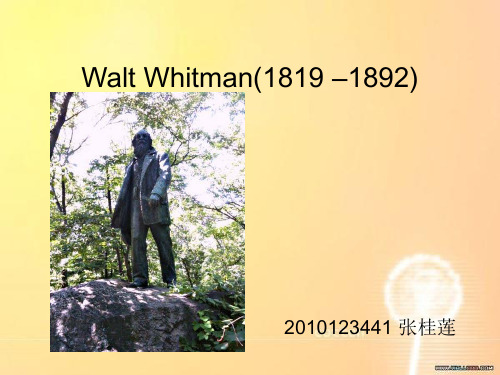
Major Themes in His Poetry
• • • • • • • Equality of things and beings Divinity of everything Multiplicity of nature Self-reliant spirit Death, beauty of death Expansion of America Brotherhood and social solidarity (unity of nations in the world) • Pursuit of love and happiness
Leaves of Grass 草叶集
First published in 1855 with only 12 poems Nine editions and last edition includes more than 400 poems Celebrates the ideals of equality, democracy, the dignity, selfreliant spirit and joy of common people Grass---the most common thing with the greatest vitality, as a symbol of the rising American
O Captain! My Captain
Captain! my Captain! our fearful trip is done, The ship has weather'd every rack, the prize we sought is worn, The port is near, the bells I hear, the people all exulting, While follow eyes the steady keel, the vessel grim and daring; But O heart! heart! heart! O the bleeding drops of red! Where on the deck my Captain lies, Fallen cold and dead. O Captain! my Captain! rise up and hear the bells; Rise up--for you the flag is flung--for you the bugle trills, For you bouquets and ribbon'd wreaths--for you the shores crowding, For you they call, the swaying mass, their eager faces turning; Here, Captain! dear father! This arm beneath your head; It is some dream that on the deck You've fallen cold and dead. My Captain does not answer, his lips are pale and still, My father does not feel my arm, he has no pulse or will; The ship is anchor'd safe and sound, its voyage closed and done; From fearful trip the victor ship comes in with object won; Exult, O Shores! and ring, O bell! But I, with mournful tread, Walk the deck my Captain lies, Fallen cold and dead.
Walt-Whitman--沃尔特·惠特曼-英美文学知识讲解

• Edited a newspaper, the LongIslander, in Huntington
• Back to New York City to work as a printer and journalist
1. No fixed rhyme and scheme
• Style: free verse
2. A looser and open-ended syntactical structure 3. The habit of using snapshots(快照) 4. Use of conversational image 5. Strong tendency to use oral English 6. Vocabulary- powerful, colorful, rarely-used words
Whitman's democratic ideas govern his poetry-writing.
In his famous poetry, openness, freedom, and above all, individualism (the belief that the rights and freedom of individual people are most important) are all that concerned him.
His Leaves of Grass has always been considered a monumental work. It commands great attention because of its uniquely poetic embodiment of American democratic ideals.
诗人惠特曼的简介
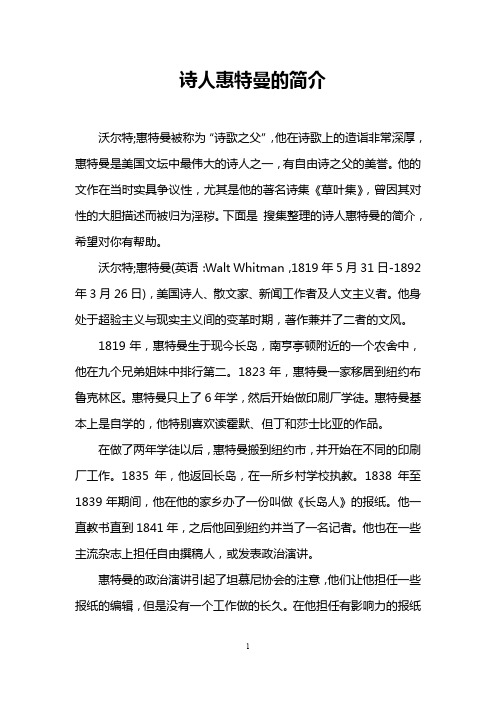
诗人惠特曼的简介沃尔特;惠特曼被称为“诗歌之父”,他在诗歌上的造诣非常深厚,惠特曼是美国文坛中最伟大的诗人之一,有自由诗之父的美誉。
他的文作在当时实具争议性,尤其是他的著名诗集《草叶集》,曾因其对性的大胆描述而被归为淫秽。
下面是搜集整理的诗人惠特曼的简介,希望对你有帮助。
沃尔特;惠特曼(英语:Walt Whitman,1819年5月31日-1892年3月26日),美国诗人、散文家、新闻工作者及人文主义者。
他身处于超验主义与现实主义间的变革时期,著作兼并了二者的文风。
1819年,惠特曼生于现今长岛,南亨亭顿附近的一个农舍中,他在九个兄弟姐妹中排行第二。
1823年,惠特曼一家移居到纽约布鲁克林区。
惠特曼只上了6年学,然后开始做印刷厂学徒。
惠特曼基本上是自学的,他特别喜欢读霍默、但丁和莎士比亚的作品。
在做了两年学徒以后,惠特曼搬到纽约市,并开始在不同的印刷厂工作。
1835年,他返回长岛,在一所乡村学校执教。
1838年至1839年期间,他在他的家乡办了一份叫做《长岛人》的报纸。
他一直教书直到1841年,之后他回到纽约并当了一名记者。
他也在一些主流杂志上担任自由撰稿人,或发表政治演讲。
惠特曼的政治演讲引起了坦慕尼协会的注意,他们让他担任一些报纸的编辑,但是没有一个工作做的长久。
在他担任有影响力的报纸《布鲁克林之鹰》的两年间,民主党内部的分裂使得支持自由国土党的他离开了工作。
在他尝试为自由国土办报纸的努力失败后,他开始在不同的工作间漂浮。
1841年到1859年间,他共在新奥尔良编辑过1份报纸、纽约2份报纸和长岛四份报纸。
在新奥尔良的时候,他亲眼目睹了奴隶拍卖;;当时很普遍的事情。
这时,惠特曼开始着力写诗。
19世纪40年代是惠特曼长期工作的第一个收获期:1841年他出版了一些短篇故事,一年后他在纽约出版了小说《富兰克林;埃文斯》(Franklin Evans)。
第一版的草叶集是他自己付费出版的,出版于1855年,也是他父亲去世的那年。
whitman打破了美国诗歌
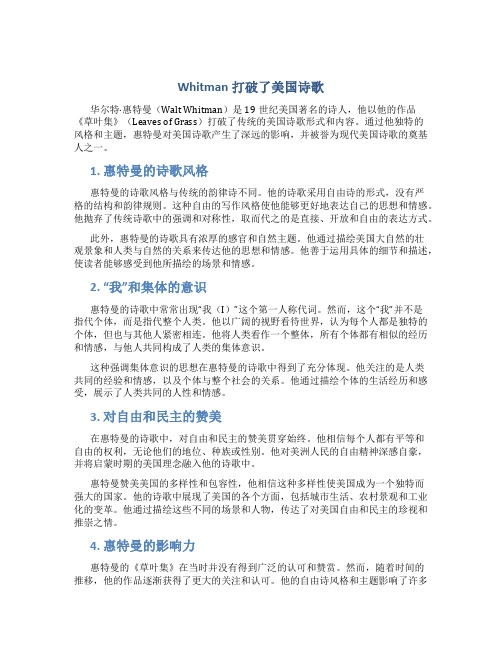
Whitman打破了美国诗歌华尔特·惠特曼(Walt Whitman)是19世纪美国著名的诗人,他以他的作品《草叶集》(Leaves of Grass)打破了传统的美国诗歌形式和内容。
通过他独特的风格和主题,惠特曼对美国诗歌产生了深远的影响,并被誉为现代美国诗歌的奠基人之一。
1. 惠特曼的诗歌风格惠特曼的诗歌风格与传统的韵律诗不同。
他的诗歌采用自由诗的形式,没有严格的结构和韵律规则。
这种自由的写作风格使他能够更好地表达自己的思想和情感。
他抛弃了传统诗歌中的强调和对称性,取而代之的是直接、开放和自由的表达方式。
此外,惠特曼的诗歌具有浓厚的感官和自然主题。
他通过描绘美国大自然的壮观景象和人类与自然的关系来传达他的思想和情感。
他善于运用具体的细节和描述,使读者能够感受到他所描绘的场景和情感。
2. “我”和集体的意识惠特曼的诗歌中常常出现“我(I)”这个第一人称代词。
然而,这个“我”并不是指代个体,而是指代整个人类。
他以广阔的视野看待世界,认为每个人都是独特的个体,但也与其他人紧密相连。
他将人类看作一个整体,所有个体都有相似的经历和情感,与他人共同构成了人类的集体意识。
这种强调集体意识的思想在惠特曼的诗歌中得到了充分体现。
他关注的是人类共同的经验和情感,以及个体与整个社会的关系。
他通过描绘个体的生活经历和感受,展示了人类共同的人性和情感。
3. 对自由和民主的赞美在惠特曼的诗歌中,对自由和民主的赞美贯穿始终。
他相信每个人都有平等和自由的权利,无论他们的地位、种族或性别。
他对美洲人民的自由精神深感自豪,并将启蒙时期的美国理念融入他的诗歌中。
惠特曼赞美美国的多样性和包容性,他相信这种多样性使美国成为一个独特而强大的国家。
他的诗歌中展现了美国的各个方面,包括城市生活、农村景观和工业化的变革。
他通过描绘这些不同的场景和人物,传达了对美国自由和民主的珍视和推崇之情。
4. 惠特曼的影响力惠特曼的《草叶集》在当时并没有得到广泛的认可和赞赏。
惠特曼 鼓励的诗
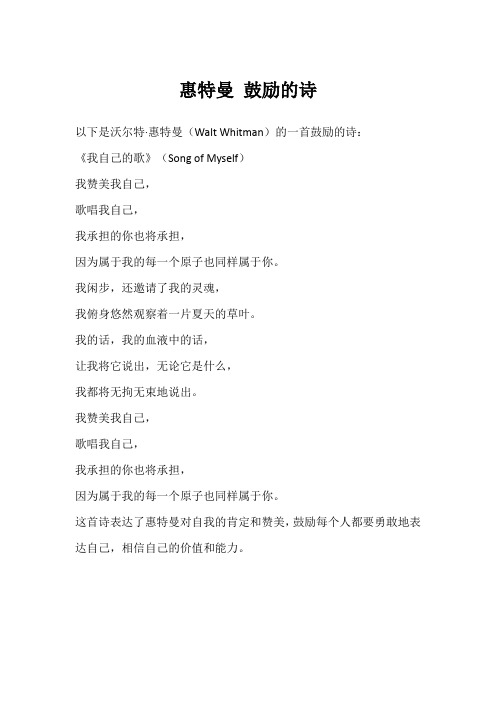
惠特曼鼓励的诗
以下是沃尔特·惠特曼(Walt Whitman)的一首鼓励的诗:
《我自己的歌》(Song of Myself)
我赞美我自己,
歌唱我自己,
我承担的你也将承担,
因为属于我的每一个原子也同样属于你。
我闲步,还邀请了我的灵魂,
我俯身悠然观察着一片夏天的草叶。
我的话,我的血液中的话,
让我将它说出,无论它是什么,
我都将无拘无束地说出。
我赞美我自己,
歌唱我自己,
我承担的你也将承担,
因为属于我的每一个原子也同样属于你。
这首诗表达了惠特曼对自我的肯定和赞美,鼓励每个人都要勇敢地表达自己,相信自己的价值和能力。
简析惠特曼《自我之歌》

简析惠特曼《自我之歌》沃尔特??惠特曼(Walt Whitman, 1819-1892)是一位世界著名的美国民主主义诗人,是美国文学史上的革新派代表。
他创作的诗歌体被后人称为自由体,因为惠特曼认为民主之音不能被传统的诗歌形式所束缚。
1855年他首次出版了他的著名诗集《草叶集》。
《草叶集》第一版问世时,共收诗12首,最后出第9版时共收诗383首,其中最长的一首《自我之歌》共1 336行。
这首诗的内容几乎包括了作者毕生的主要思想,是作者最重要的诗歌之一。
惠特曼诗歌的艺术风格和传统的诗体大不相同。
他一生热爱意大利歌剧、演讲术和大海的滔滔浪声。
西方学者指出这是惠特曼诗歌的音律的主要来源。
他的诗歌从语言和题材上深刻地影响了20世纪的美国诗歌。
《草叶集》问世后,评论家们议论纷纷,毁誉参半,争论焦点就是《自我之歌》。
尽管当时美国文坛的盟主爱默生独具慧眼,读完诗集以后赞赏有加,并写信给惠特曼,称赞“它是美国出版过的最出色的,富有才智和智慧的诗篇”,但是由于其异于常规的风格而受到绝大多数作家和批评家包括费罗、罗威尔的猛烈攻击。
惠特曼写诗的初衷是希望为人民大众所接受,遗憾的是却被大多数公众所忽视。
一、一首抒情诗史惠特曼在《我自己的歌》一诗的开头写道:我赞美我自己,歌唱我自己,我承担的你也将承担,因为属于我的每一个原子也同样属于你。
在这首诗的最后一节,诗人又是这样写的:如果你一时找不到我,请不要灰心丧气,一处找不到再到别处去找,我总在某个地方等候着你。
全诗以“我”开篇,又以“你”结尾,这种写法有其独特的艺术魅力。
纵观全诗,尽管这个“我”总是以叙事者的身份在诗中占据主导地位,但是这个“你”却始论文联盟整理终伴随着“我”歌唱着《我自己的歌》。
在惠特曼之前,从未有哪一个美国诗人像他这样如此重视过读者的作用。
与19世纪许多浪漫派诗人一样,惠特曼也怀着一种强烈的自我意识,在诗歌创作中用第一人称“我”为主人公,抒发诗人个人的情感。
惠特曼

(二)基本主题:
自我 、创造和民主 ”我,惠特曼,一个美国人,一个粗鲁 惠特曼,一个美国人, 汉,一个世界,纵情声色……饥餐,渴饮, 一个世界,纵情声色 饥餐,渴饮, 饥餐 传种接代“。(《自我之歌》) 传种接代“。(《自我之歌》 诗人认为: 诗人认为:”任何一件占据着自己的时 间和空间的事物,都与其他事物相等。 间和空间的事物,都与其他事物相等。”
沃尔特·惠特曼 沃尔特 惠特曼
一、生平简介
沃尔特·惠特曼 沃尔特 惠特曼 WaltWhitman,1819年 (WaltWhitman,1819年5 31日 1892年 26日 月31日-1892年3月26日), 生于纽约州长岛, 生于纽约州长岛,他是美 国著名诗人、人文主义者, 国著名诗人、人文主义者, 他创造了诗歌的自由体 (Free Verse),其代表 Verse),其代表 ), 作品是诗集《草叶集》 作品是诗集《草叶集》。
草叶集》 《草叶集》的自由之声和自由体诗震惊了 当时的读者。惹恼了学院派文人。 当时的读者。惹恼了学院派文人。惠特曼骄傲 地宣称:他的诗中没有了“ 地宣称:他的诗中没有了“旧世界赞歌中高大 突出的人物” 而有的是“ 突出的人物”,而有的是“作为整个事业及未 来主要成就的最大因素的各地普通农民和机械 工人” 这是符合实际的。 工人”,这是符合实际的。他既是自然的诗人 也是城市的诗人。 也是城市的诗人。当英美诗人们纷纷从城市向 乡村逃遁时,他却在钢铁时代的纽约纵情高歌, 乡村逃遁时,他却在钢铁时代的纽约纵情高歌, 既歌唱高山、大海、草原,也歌唱火车头、 既歌唱高山、大海、草原,也歌唱火车头、电 脱粒机,这些都是新大陆、新时代的产物, 缆、脱粒机,这些都是新大陆、新时代的产物, 他把它们一起拥抱。 他把它们一起拥抱。
二、草 叶 集
Walt-Whitman--沃尔特·惠特曼-英美文学
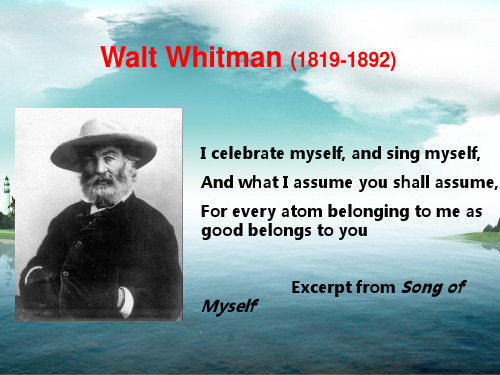
• Back to New York City to work as a printer and journalist
• Experienced various jobs
• Began writing a new kind of poetry (free verse)
• His purpose is to express some new poetical feelings and to initiate a poetic tradition in which difference should be recognized. He wanted to behave as a supreme individualist.
Excerpt from Song of
Life
• Born: 31 May 1819 • Birthplace: Long Island,
New York. • Died:26 March 1892
• Born in a working-class family, son of a carpenter
• The first version of his masterpiece, Leaves of Grass, appeared in 1855.
• Emerson praised Whitman’s poetry as “the most extraordinary piece of wit and wisdom that America has yet to contribute.”
• filled with optimistic expectation and enthusiasm about new things and new epoch.
- 1、下载文档前请自行甄别文档内容的完整性,平台不提供额外的编辑、内容补充、找答案等附加服务。
- 2、"仅部分预览"的文档,不可在线预览部分如存在完整性等问题,可反馈申请退款(可完整预览的文档不适用该条件!)。
- 3、如文档侵犯您的权益,请联系客服反馈,我们会尽快为您处理(人工客服工作时间:9:00-18:30)。
• Attended public school • Apprenticed to a printer
• Returned to Long Island in 1835 and taught in country schools
• In Song of Myself, Whitman believed that two people could be “twain yet one”, their paths could be different, and yet they could achieve a kind of transcendent contact.
Leaves of Grass
• Walt Whitman has devoted all his life to the creation of the “single” poem, Leaves of Grass .The work has nine editions.
• In this giant work, openness, freedom, and individualism are all that concerned him.
• Song of Myself is a history of the pndividual to active spirit.
Drum Taps
• In May 1865 Walt began printing his Civil War literature, entitled Drum-Taps.
of foreign origin, wrong words 7. Sentences- different lengths, disturbed, separate
• Rhyme 1. a rhythm of thought 2. cadences of his feeling 3. Parallelism
• His purpose is to express some new poetical feelings and to initiate a poetic tradition in which difference should be recognized. He wanted to behave as a supreme individualist.
• Some of Whitman’s poems are political committed. Before and during the Civil War, he stood firmly on the side of the North. Drum Taps Drum Taps is the collection of his emotions and feelings during the period.
Song of Myself
• Song of Myself was originally published in the 1855 edition of Leaves of Grass in which it was the first of twelve poems. At the time this poem was untitled, in 1881 Whitman gave the poem its final name: Song of Myself.
His Leaves of Grass has always been considered a monumental work. It commands great attention because of its uniquely poetic embodiment of American democratic ideals.
1. No fixed rhyme and scheme
• Style: free verse
2. A looser and open-ended syntactical structure 3. The habit of using snapshots(快照) 4. Use of conversational image 5. Strong tendency to use oral English 6. Vocabulary- powerful, colorful, rarely-used words
• filled with optimistic expectation and enthusiasm about new things and new epoch.
1. The whole hard-working people The burgeoning life of cities. The fast growth of industry and wealth in cities
Leaves of Grass
• Most of the poems in Leaves of Grass sing of the “en-masse” and the self as well. Whitman also gives emphasis to the physical dimension of the self and openly celebrates sexuality.
Walt Whitman was an American poet, essayist, journalist, and humanist. Proclaimed the "greatest of all American poets" by many foreign observers a mere four years after his death.
Important Features in Whitman’s Poems
• The first person narrator: “I” the subject in the poem, “you” the reader Invites us to participate in the process of sympathetic identification.
2. Individual value
3. Pursuit of love and happiness
4. Sexual love The individual person and his desires must be respected.
Influence
America’s first “poet of democracy”
Whitman's democratic ideals& individualism
America’s first “poet of democracy”
Whitman's democratic ideas govern his poetry-writing.
In his famous poetry, openness, freedom, and above all, individualism (the belief that the rights and freedom of individual people are most important) are all that concerned him.
works
• Leaves of Grass • Songs of Myself • There was a Child Went forth • I hear America sining • Drum Taps
Leaves of Grass
• Whitman’s originality first in his use of the poetic form free verse (i.e. poetry without a fixed beat or regular rhyme scheme)
To repeat the idea in the lines with minor changes in wording (the line is the rhythmical unit)
4. Phonetic recurrence Repetition of the first words and phrases
Whitman brings the hard-working farmers and laborers into American literature ,attack the slavery system and racial discrimination.
The themes in Whitman's poetry
• Pursuit of love and happiness is approved of repeatedly affectionately in his lines.
• If two persons are really in love, “what is to us what the rest do or think?” The individual person and his desires must be respected. Obviously, Whitman’s sexual themes are beyond the physical.
• Edited a newspaper, the LongIslander, in Huntington
• Back to New York City to work as a printer and journalist
• Experienced various jobs
• Began writing a new kind of poetry (free verse)
